Creating sisterhood through Literature
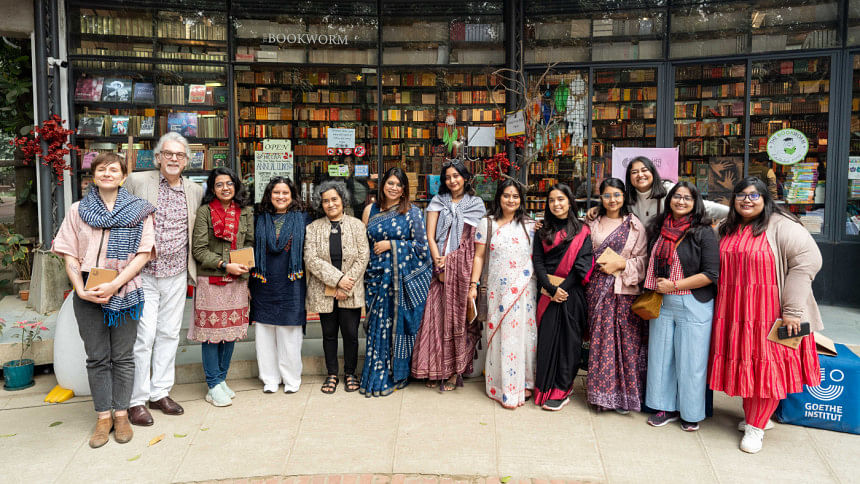
It is woeful to see how underrepresented women are in literature. No matter how successful a female writer becomes, her voice and works are buried under the debris of male writers. Female readers crave to read stories and literary works which highlight their complex feelings and thoughts. This underrepresentation of women in literature is clear, especially in Bangladesh where women have limited access to publish and present their works to a wider audience.
To promote female penmanship, Goethe-Institut Bangladesh and HerStory, in collaboration with Bookworm Bangladesh and Star Books and Literature, organised a reading session entitled Reading Women Together at the Justice Shahabuddin Park on January 26. Stepping into its fourth year, the Sister Library allows female writers to present excerpts from their literary pieces to the audience.
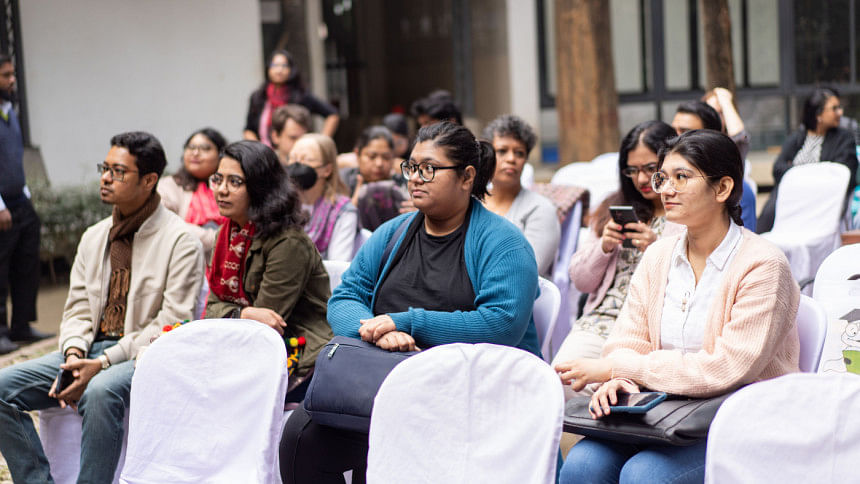
The buzz for the event was high among the readers, especially women, who felt neglected in the world of literature. Even the chilly Friday morning did not dampen the excitement as the audience came to support the writers who narrated parts of their works at the event. Held under the open sky and amid the serene park, Sister Library was a community of authors and readers who sincerely supported each other. It allowed them to create a sisterhood through their mutual love to read and write books and opened the possibilities for the female writers to showcase their talents and engage in discussions with their readers.
The event started with encouraging words from Frank Werner (Director of Goethe Institut), Amina Rahman (Managing Director of Bookworm), Nazia Manzoor (Editor of Star Books and Literature), and Katerina Don (Creative Director of HerStory).
"It gives us an opportunity to listen to voices, young and emerging, established and permanent," said Nazia Manzoor. "So that we can have a conversation about love, loss, poetry, emotions, and everything that sustains us."
There was an ensemble of authors who had infinite creativity, and they captured the audience's attention from the get-go. The first writer, Amreeta Lethe, read an excerpt from her essay titled "Where have all the women gone?" She challenged the lack of female writers in the educational curriculum because discussions about female authors in literary canons were rare and dominated by men.
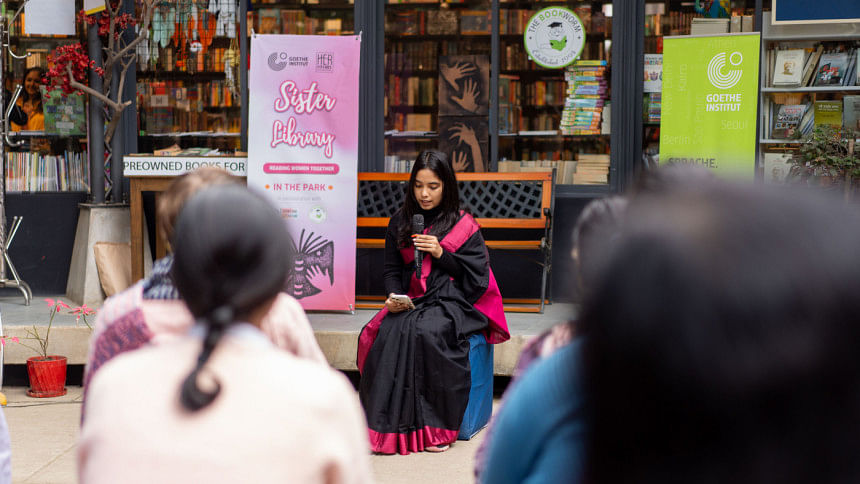
The poem, "Running on Borrowed Time", by Maliha Tribhu highlighted women and how their voices are suppressed in the society. She read a second poem, "My Inner Rebel", which was a message she would like to give her future self. Almost every woman went through this dilemma of whether to conform to societal norms or let their inner rebels be free from the shackles put on women.
Also gracing the event was Farah Ghuznavi, an established author who wrote award winning stories for the Commonwealth Competition and Oxford University GEF Writing Festival. She shared three short stories, from which the most intriguing was "Hair", that was about Mohona and her unruly hair. The hair represented her rebellious personality and touched upon how society judges women's beauty based on their hair.
The fourth aspiring poet, Raya Mubasshira, narrated her poem, "Shades of Being". It beautifully captured a woman's will to live life to the fullest, enticing the audience with its subtle charm. This was followed by Sadia Afrin's poem, "Sheetkaaler Ekal Shekal" (This and That of Winter). In it, she described the winters she spent in Rajshahi with her family and the bond she shared with her sibling. Then, Tashfia Ahmed presented a poem, "To Nanu and The Home She Is". It was an ode to her maternal grandmother who was not only beautiful but also a kind-hearted person who loved her children and grandchildren unconditionally. The final author, Tabassum Islam Susmi, told an emotional story about a trip to Kolkata with her father. It reflected the bond she shared with her father and their adventures in Kolkata.
Listening to the talented authors and poetesses ignited a spark of inspiration among the attendants. The response was enthusiastic because the audience members asked questions and engaged in discussions with the writers about their motivations and ambitions. It was a cordial conversation in the open air, allowing ideas and dreams to float freely.
Finally, there was a small session hosted by Amina Rahman, Nazia Manzoor, and Katerina Don where they discussed with the audience about reading goals for 2024 and how to develop writing habits. In response, the attendees replied with the reading goals they would like to achieve like finishing pending books, reading more historical fiction, or inspiring others to read.
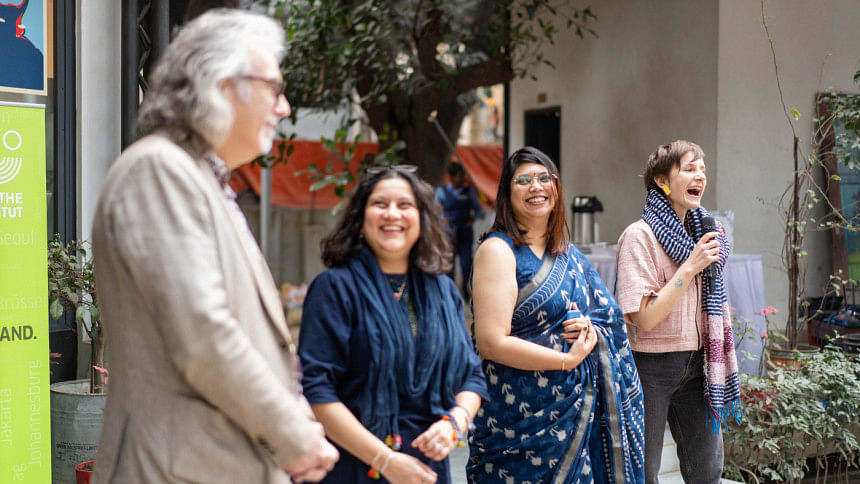
Several writers also shared their experiences with writing. They talked about the changing the publishing landscape and how important it is to hook the readers within the first few chapters.
"The writers today are reading from their unpublished works that they kept to themselves, but today they share", said Katerina Don. "And that is what Sister Library is about. It's not only about giving people the opportunity to read women but also to celebrate young writers."
The discussion ended with the writers imparting words of wisdom to aspiring authors. Young authors were advised to seek inspiration in everyday things and build a supportive community.
All in all, Sister Library embodied the spirit and ambitions of the young writers who wanted to etch their names in female literature and break barriers through their words.
Tashnuva Sumaiya Islam, when not reading, writes Romantasy and Historical Romance books. E-mail her at [email protected].

 For all latest news, follow The Daily Star's Google News channel.
For all latest news, follow The Daily Star's Google News channel. 

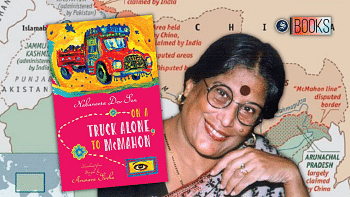


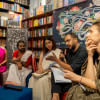
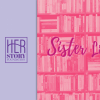
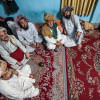




Comments